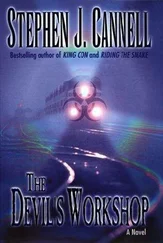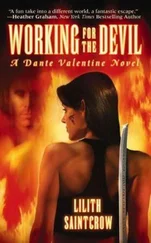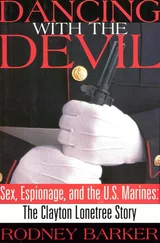Алан Джадд - The Devil's Own Work
Здесь есть возможность читать онлайн «Алан Джадд - The Devil's Own Work» весь текст электронной книги совершенно бесплатно (целиком полную версию без сокращений). В некоторых случаях можно слушать аудио, скачать через торрент в формате fb2 и присутствует краткое содержание. Жанр: sf_mystic, на английском языке. Описание произведения, (предисловие) а так же отзывы посетителей доступны на портале библиотеки ЛибКат.
- Название:The Devil's Own Work
- Автор:
- Жанр:
- Год:неизвестен
- ISBN:нет данных
- Рейтинг книги:3 / 5. Голосов: 1
-
Избранное:Добавить в избранное
- Отзывы:
-
Ваша оценка:
- 60
- 1
- 2
- 3
- 4
- 5
The Devil's Own Work: краткое содержание, описание и аннотация
Предлагаем к чтению аннотацию, описание, краткое содержание или предисловие (зависит от того, что написал сам автор книги «The Devil's Own Work»). Если вы не нашли необходимую информацию о книге — напишите в комментариях, мы постараемся отыскать её.
The Devil's Own Work — читать онлайн бесплатно полную книгу (весь текст) целиком
Ниже представлен текст книги, разбитый по страницам. Система сохранения места последней прочитанной страницы, позволяет с удобством читать онлайн бесплатно книгу «The Devil's Own Work», без необходимости каждый раз заново искать на чём Вы остановились. Поставьте закладку, и сможете в любой момент перейти на страницу, на которой закончили чтение.
Интервал:
Закладка:
It may have been some trick of the moonlight and perhaps that would be the sensible thing to believe. Yet there was a definite moment when it finished and it seemed to me that she turned away. My last image was of bare arms at first folded, and then raised as she turned, again as if into an embrace. I probably imagined the figure of a man behind her, deep in the room. After that there was no more and I no longer felt any reason to be there. I picked my way back through the undergrowth to the gap in the fence and walked slowly down the steps to Chantal and the car. When she asked me if I had seen anything I said I had not.
I was no longer anxious about Edward and when I saw him late the next morning sitting in the window of M. Englert's, as I was on my way back from the market, I was not even surprised. He sat with a cup of coffee and a cigar, pen and paper beside him. I had never seen him smoke before.
We greeted each other with a handshake, something we never did in England. I saw he had been doodling on the paper, large circular shapes with much interweaving. 'I was expecting you,' he said.
His manner seemed to obviate questions as to why he had neither telephoned nor turned up the night before. It was as if his presence excused everything.
I sat down. 'I've never seen you smoke.'
He put the cigar to his lips and shrugged, his elbows on the table. His shirt was open at the neck, his sleeves were rolled up and he had not shaved that morning. 'What happened?' I asked, slightly irritated.
'We had good dinner and good talk. He had a heart attack after I left. He was found in the morning.'
'I had a mad idea that you'd be implicated somehow and that the police would blame you.'
'I had to make a statement. I was the last to see him.'
'What about his woman?'
'Apart from her.'
'What's she like?'
'She was hardly there. It was him and me.'
'Him and me', with its suggestion of gladiatorial combat, seemed to have been the theme of the evening. From what Edward told me then it sounded as if he had triumphed in a struggle that had nevertheless enhanced his respect for his opponent. The rest I learned years later under very different circumstances, by which time it was clear that neither the struggle nor the result had been what he thought.
Edward told me that morning that the first thing that had struck him about Tyrrel was the Old Man's age, for which, like me, he had been unprepared. Tyrrel's literary fecundity and the attention that was paid to him made one think of him as a much younger man, but his spine was curved into a stoop, his movements were slow and uncertain, his hands knobbled and stiff and his blue eyes — that evening, anyway — were rheumy. Yet his mind was more than sharp enough, as Edward was to discover, though at the time Edward's reaction was to feel guilty at having attacked so frail an old man, even in print. Whisky helped dispel the guilt. They sat in Tyrrel's study — the room in which I had seen him — which Edward described as bare and uncluttered, making it sound like his own. Tyrrel congratulated him on the review.
'I would not say you hit the nail on the head,' Tyrrel said, 'but you knocked it a good way in. Nonetheless, the lid is not quite down. There are more nails.'
'I wasn't meaning to bury you.'
The Old Man smiled. 'The fox chasing its tail is a good analogy of the way I have frequently written. Style itself becomes the end and people forget to ask what it is for. You cannot entirely blame them. There is trickery in all art and if no one complains that a book is more trickery than substance there must be art enough in the trickery, which then becomes admirable. But what you said about my last book was wrong. You mishit that nail.'
This was the novel based on the Faust theme that Edward's review was ostensibly about. It was, as I think I have said, less artistic and self-conscious than its predecessors, little more than a statement of its theme, a dramatic but bald assertion that in the end a price is paid.
'The simplicity of that book,' said Tyrrel, 'is deliberate.
It is not due to lack of art or energy. It reflects the reality it describes. It is neither an aberration nor a throw-back but a confirmation of the unity of all my work. In the beginning was the bargain, then the years of success and elaboration, now the price.' He smiled and poured more whisky. 'I read your own novel after I had seen your review. It shows great promise and I believe it is the sign I have been seeking among young writers for many years now. It is, of course, a failure' — his rheumy eyes twinkled faintly — but an interesting one. You tried to keep spirit out, did you not? Perhaps you didn't call it that but that's what it amounts to. You failed. But never mind. You must try again and keep trying. Look at my books, particularly the ones you think most foxily fraudulent. You will find it hard to write with less of the spirit than that; but you will try.'
Tyrrel's speech was old-fashioned and clipped, more formal than ours. He spoke precisely in measured periods and his voice seemed younger than his body. His manner was courteous and he listened with attention. Yet Edward did not like him. He disliked the way in which, whatever they discussed, the Old Man seemed to want it both ways: yes, there was too much mere style in what he had written but that was deliberate, so it was all right; yes, his first and last books were stark statements of theme but the theme itself was stark, so that too was all right; on the one hand, he was a writer who was political and on the other he was a political who wrote; he had always been of the Left, of course, though he had right-wing sympathies; he was utterly committed to his writing and could imagine no other life; at the same time, he was a writer who was prepared to commit himself to anything while being essentially committed to nothing. Of religion he said: 'Sympathize with all, believe nothing. And remember that the devil never lies.'
There was something beneath Tyrrel's courtesy that Edward particularly disliked, a reserve, a coldness, a perhaps unreachable pride that deterred any real fellow-feeling. As Edward described all this in unusual detail it occurred to me that the same might be said of him, though I realized it intellectually without actually feeling it. I also thought that his conversation with Tyrrel did not sound as confrontational as he had said; more a laying-on of hands than a contest, I suggested.
Edward was curtly eager to convince me otherwise. 'I haven't told you all. There was more to it than that.' They had argued about matter and form, about substance and art, about ex post facto justification, about sincerity.
'Do you believe in sincerity?' Tyrrel had asked.
Like most of us, Edward assumed the answer to be so obvious that he had never asked himself the question. 'Yes.'
Tyrrel's smile was mocking. 'I have a soft spot for romanticism. '
'Sincerity pre-dates romanticism.'
'Infinitely, infinitely.'
I was still not clear why Edward regarded this as a victory.
Afterwards they ate pizzas which Tyrrel heated in a microwave oven. They discussed writing routines, a subject which I believe writers find more interesting than themes or theories. Tyrrel wrote in longhand on plain paper, with a fountain pen.
'Not even a typewriter?'
'I used to, years ago. Then I tried a word processor.
But I gave them both up. I hear better with a pen in my hand.'
'You hear the voices?'
'I hear the pen. It took a long time to accept that that is really my only choice, listening to the pen. I used to do anything I could to drown it but nothing ever worked. I had to surrender myself to it.'
Edward assumed that this was no more than a pardonably eccentric way of saying that machines get in the way. He told me that it was after midnight — and a lot more whisky — when he left.
Читать дальшеИнтервал:
Закладка:
Похожие книги на «The Devil's Own Work»
Представляем Вашему вниманию похожие книги на «The Devil's Own Work» списком для выбора. Мы отобрали схожую по названию и смыслу литературу в надежде предоставить читателям больше вариантов отыскать новые, интересные, ещё непрочитанные произведения.
Обсуждение, отзывы о книге «The Devil's Own Work» и просто собственные мнения читателей. Оставьте ваши комментарии, напишите, что Вы думаете о произведении, его смысле или главных героях. Укажите что конкретно понравилось, а что нет, и почему Вы так считаете.











